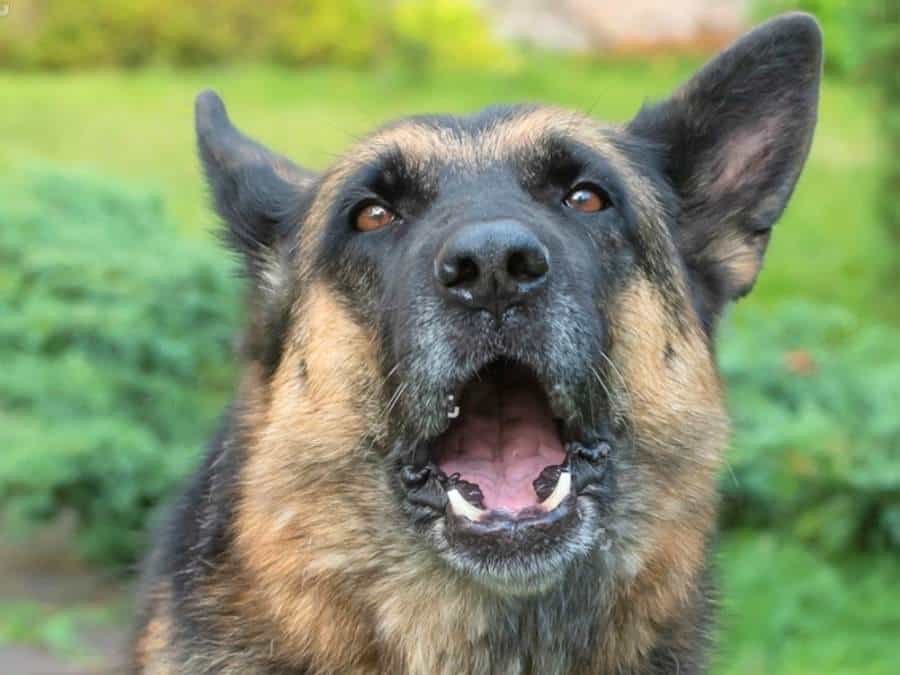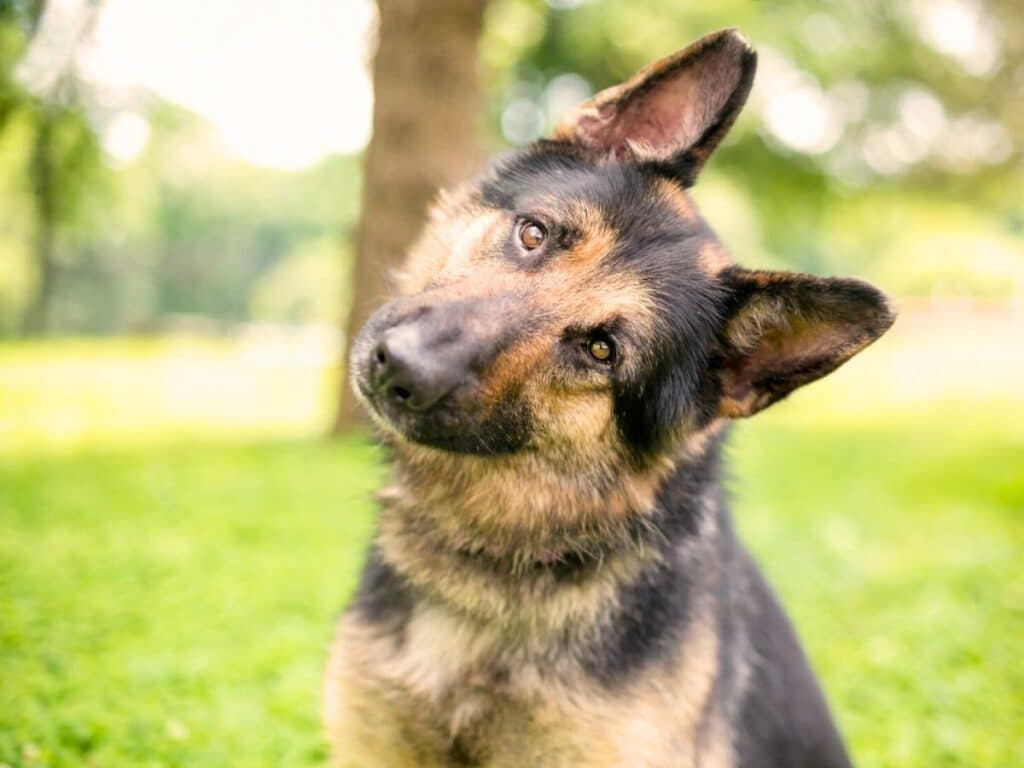If you’re curious about the unique behavior stages a German Shepherd pup goes through as they age, you’ve come to the right place.
As a seasoned parent to three wonderful German Shepherds, I’ve witnessed firsthand the quirks, joys, and challenges that come with each stage of their development.
Much like us, our canine companions undergo distinct phases as they mature, and understanding these behavioral shifts can deepen the bond between you and your loyal friend.
German Shepherd Behavior Stages
German Shepherd personality development can be broadly divided into several stages, each characterized by distinct physical and behavioral changes.
If you’re a proud owner of a German Shepherd pup or thinking about becoming one, understanding how your furry friend grows and behaves is extremely important.
The infographic below showcases several stages of German Shepherd behavior according to their age. From puppyhood to senior years, the following image sheds light on the challenges, joys, and milestones that accompany each stage.

Understanding these stages is crucial for dog owners like us, as it provides insights into the unique needs and challenges that arise at different points in a dog’s early life.
Here are the 7 stages of German Shepherd puppy behavior during their growth and development:
Stage 1: Neonatal Period (Birth – 2 Weeks)
During the neonatal period, which lasts from birth to around two weeks of age, German Shepherd puppies are completely dependent on their mother for survival.

Here are some key features of the German Shepherd puppy’s neonatal period:
- Born with sealed eyelids and ear canals.
- Unable to regulate their body temperature and rely on the mother and littermates for warmth.
- They can crawl but are not yet able to walk.
- Primary activities are nursing and sleeping.
- Despite their small size at birth, puppies undergo rapid growth during this phase.
- They gain weight daily and double their birth weight by the end of 2 weeks.
- Around day 10, the puppy’s eyes and ears are beginning to open.
- Social bonds with littermates begin to form.
- Start exhibiting basic reflexes, such as the rooting reflex (seeking the mother’s nipple), and sucking reflex.
RELATED: How Many Hours Does a German Shepherd Puppy Sleep?

You can learn all about the key milestones in your German Shepherd’s development and growth in my comprehensive ‘German Shepherd Growth Chart By Age‘ article.
Stage 2: Transitional Period (2 – 3 Weeks)
Between two to three weeks of age, German Shepherd puppies enter the transitional period. During this time, their motor skills and senses start developing rapidly as they become more aware of their surroundings.

Here are some key features of the transitional period:
- Eyes and ears are fully open by now, but vision and hearing are still limited.
- They start attempting to stand on wobbly legs and may take their first unsteady steps.
- Baby teeth start to emerge.
- They start to explore their environment by mouthing and chewing on objects.
- Puppies begin to eliminate on their own.
- As motor skills develop, puppies engage in more active play with their littermates.
- They may start to bark, whine, or make other sounds.
Don’t forget to check out my ‘German Shepherd 101’ article. This comprehensive guide covers every aspect of German Shepherd ownership, from choosing the right puppy to navigating training, nutrition, health care, and beyond.
Stage 3: Socialization Period (3 – 12 Weeks)
During the socialization period, which typically occurs between 3 to 12 weeks of age, German Shepherds go through crucial stages of development. According to the UC Davis School of Veterinary Medicine, this is the time when they are most receptive to learning and adapting to their environment.
Proper socialization during this period is essential for shaping their behavior and ensuring they grow up to be well-adjusted dogs.
Here are some key aspects of the socialization period:
3 – 5 Weeks

- Puppies become highly receptive to new experiences and stimuli.
- They have a full set of teeth by this time.
- The weaning process begins, and the puppies become more reliant on solid food for nutrition.
5 – 8 Weeks

- They become increasingly curious about their surroundings and actively explore their environment.
- Exposure to different surfaces, smells, people, objects and other dogs is important at this stage for well-rounded socialization.
- During this phase, puppies should be exposed to a variety of sounds, including household noises, traffic, and other environmental sounds.
- Positive interactions with other dogs and a variety of people, including adults, children, and strangers, are crucial at this stage.
- They can also play with toys, play fight, play with humans and other animals.
- Play with littermates continues to be important for developing social skills.
- Begin to eat other soft foods to supplement their mother’s milk.
8 – 12 Weeks

- German Shepherd pup’s ears begin to come up.
- Puppies may become more cautious and fearful of new experiences.
- Nipping behaviors begin as they practice biting behavior with their mother and litter mates.
- This is an ideal time to begin basic training, including commands like “sit,” “stay,” and “come.”
- It is also a great time to learn skills such as leash training, housebreaking, crate training, accepting gentle handling and grooming, and accepting human domination and control.
RELATED:
Stage 4: Juvenile Period (3 – 6 Months)
The juvenile period in German Shepherd puppies is characterized by continued growth, the development of adult teeth, and the onset of sexual maturity.

This is often the time when older puppies learn about their social relationships within the environment they live.
Here are some key aspects of the juvenile period:
- This stage is marked by the development of adult body proportions. (Source)
- They are playful and highly energetic.
- Around 4 months, puppies will begin to lose their puppy teeth and will soon replace them with their adult teeth.
- Puppies may exhibit increased chewing behavior to relieve the teething discomfort.
- Hormonal changes associated with sexual maturation can lead to behavioral changes.
- Male puppies may begin marking territory, and both males and females may exhibit increased interest in the opposite sex.
- By now they are typically fully housetrained.
- While still seeking attention from their owners, they may also explore on their own and assert their independence.
- They start testing boundaries and may become stubborn.
- If the puppy has not been spayed or neutered, this stage may mark the onset of sexual maturity.
Stage 5: Adolescence (6 – 18 Months)
During the adolescence stage, which typically starts around 6 months and lasts until 18 months of age, German Shepherds undergo significant physical changes. They may experience a growth spurt, where their bones and muscles develop rapidly.

Also, hormonal changes can lead to challenging behaviors like jumping, mouthing, or even showing signs of aggression.
Here are some key aspects of the adolescence period:
Male German Shepherd Adolescence Stage Behavior:
- GSDs at this stage have a full set of adult teeth and they are highly energetic.
- German Shepherd males reach sexual maturity and begin to hike their back leg when urinating.
- Your GSD pup may become territorial and begin scent marking by urinating on vertical surfaces.
- They may exhibit behaviors such as disobedience, stubbornness, or a temporary regression in training.
- Some dogs may go through a second fear period and some may suddenly seem to forget their training.
- Ongoing training is essential during adolescence to reinforce good behavior.
- Continued exposure to various people, animals, and environments to prevent the development of fear or aggression.
- Many owners choose to spay or neuter their dogs during adolescence to prevent unwanted behaviors and reproductive issues.

Female German Shepherd Adolescence Stage Behavior:
- Female German Shepherds reach sexual maturity and have their first estrus (heat) period.
- During their heat period, they may display behaviors such as increased friendliness, restlessness, and a heightened interest in male dogs.
- Some females become more affectionate, while others may become more aloof.
- Even if not pregnant, some female GSDs may display maternal instincts, showing interest in and caring for toys or other animals.
You might notice some or all of these signs, but there are also other behaviors that adolescent German Shepherds often display.
These behaviors include:
- Damaging and chewing on things they shouldn’t, like furniture, carpets, shoes, etc.
- Acting crazy and having a lot of energy, running around excitedly.
- Engaging in sexual behaviors like mounting if not spayed or neutered.
- Trying to take ownership of the bed or couch and showing aggression if you try to move them.
- Relieving themselves inside the house.
- Challenging the dominance of humans and displaying aggression.
- Not showing respect and not responding to commands.
- Resource guarding and scent marking.
- Not paying attention, especially during training.
- Intentionally choosing not to respond when called.
- Continuously testing boundaries and increased independence.
RELATED:
- German Shepherd Heat Cycle 101
- Neuter or Spay Your German Shepherd: Timing, Pros & Cons
- Understanding German Shepherd Energy Levels
Stage 6: Adulthood (2 – 3 Years)
The German Shepherd adulthood stage typically begins around 1 to 2 years of age. By the time dogs reach adulthood, they have reached their full physical size and weight. During this stage, GSDs have reached physical and sexual maturity, and they settle into their adult behaviors.

Here are some key aspects of the adulthood period:
- More stable behavior compared to the adolescence stage.
- They are less impulsive at this stage.
- They continue to exhibit social behavior and form bonds with their human family members.
- They may show affection through physical contact, such as leaning against their owners or licking.
- They exhibit protective instincts towards their human family members.
- May display territorial behaviors, such as barking to alert their owners or protecting their home environment.
- They communicate through body language, vocalizations, and other behaviors.
- Adult dogs retain a playful demeanor, enjoying playtime and interaction with their owners.
- They benefit from ongoing training and reinforcement of basic commands.
Stage 7: Senior Years (9 – 12 Years)
A German Shepherd’s average lifespan is between 9 – 13 years. So a GSD typically reaches their senior years when he is around 8 – 10 years old.

As your German Shepherd enters this stage of life, they may experience certain physical and cognitive changes that require special attention and care.
Here are some key aspects of the senior years in dogs:
- Decline in energy levels.
- Some senior GSDs may continue to be active, others may become less interested in play and physical activities.
- They tend to sleep more and may experience changes in their sleep patterns.
- Cognitive decline leading to changes in memory, awareness, and problem-solving ability.
- May become disoriented, forget familiar routines, or show signs of confusion.
- Some senior dogs may exhibit restlessness, anxiety, or vocalization, especially if they are experiencing discomfort.
- Arthritis and joint issues are common in senior dogs, leading to stiffness and reduced mobility.
- They may become less tolerant of certain interactions, especially those that cause discomfort.
- Senior German Shepherds may experience a decline in hearing or vision.
- They may become more affectionate and dependent on their owners.
- Providing comfort, attention, and a sense of security becomes crucial during this stage.
Owners need to be attentive to changes in their senior dogs’ behavior and consult with a veterinarian if there are concerns. Regular veterinary check-ups, a supportive environment, and adjustments to care routines help ensure a comfortable and happy life for senior dogs.

Fear Periods in German Shepherds
The concept of “fear periods” in a puppy’s development is a generalization, and not all puppies experience them in the same way or at the same time. However, there are commonly recognized fear periods during a puppy’s development.
The two main fear periods are often noted at around 8-11 weeks and then again around 6-14 months.
During these periods, a puppy may show signs of fear or anxiety that they didn’t exhibit before. Owners need to handle these situations carefully, using positive reinforcement and gentle exposure to help the puppy overcome their fears.
It’s important to understand that fear periods are a normal part of their development and should not be cause for alarm.
It’s also worth noting that these periods can vary from one individual dog to another. Additionally, ongoing socialization and positive experiences throughout a dog’s life can help mitigate fear and anxiety issues.
RELATED: Why Is My German Shepherd So Hyper?
Conclusion
So now you have a deeper understanding of the various German Shepherd behavior stages. From their neonatal and transitional periods to their adolescence and adulthood, each stage presents unique challenges and opportunities for growth.
Remember, raising a German Shepherd is a journey filled with ups and downs. It’s important to be patient, consistent, and understanding throughout each stage. By investing time in their training and socialization, you can help your furry friend become a well-rounded and balanced companion.
Frequently Asked Questions (FAQs)
1. At what age do German Shepherds calm down?
German Shepherds typically start to calm down around 2 to 3 years of age as they mature and settle into adulthood.
2. What is the normal behavior of a German Shepherd?
German Shepherds are known for their intelligence, loyalty, and protective instincts. They are often energetic, alert, and exhibit a strong work ethic, making them excellent working and family dogs.
3. At what age are German Shepherds fully mature?
German Shepherds are generally fully mature by the age of 3, both physically and behaviorally. However, individual variations may occur.
4. What are the behavior problems of German Shepherd dogs?
Common behavior problems in German Shepherds may include excessive barking, aggression, and anxiety if not properly trained and socialized. Regular exercise, mental stimulation, and consistent training can help address these issues.
FURTHER READING ON GERMAN SHEPHERDS:




